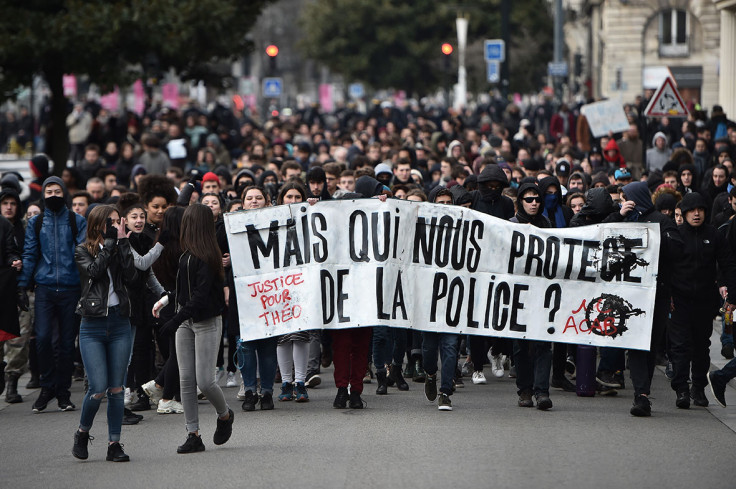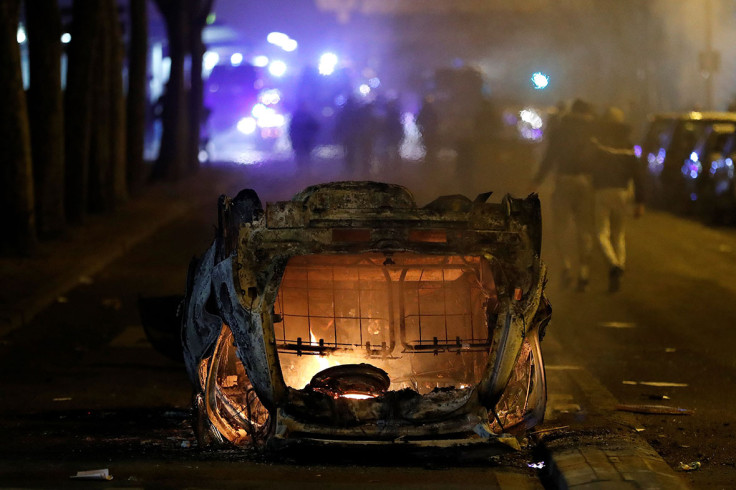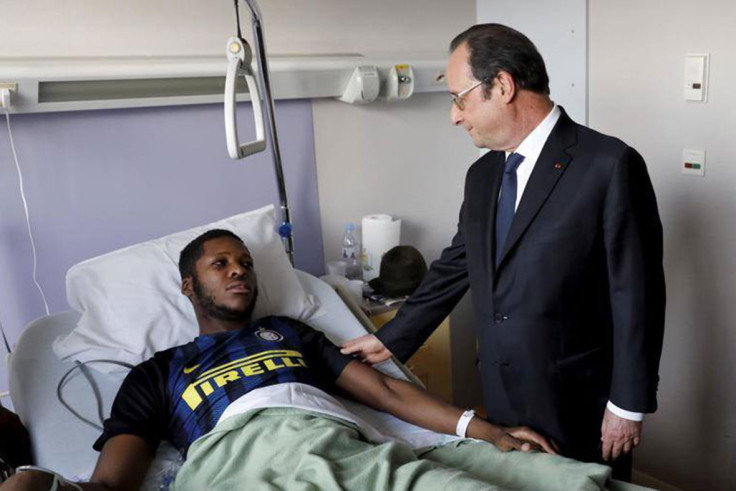The ghost of 2005 banlieue riots haunts France in second week of protests against police brutality
The underlying issues affecting the disadvantaged suburbs have gotten worse in the past 12 years.
Ongoing rallies in the French suburbs protesting the alleged rape of a young black man in police custody are bringing back the ghost of the three weeks of violence that shook the country in 2005.
Another 25 people were arrested in the night between Monday (13 February) and Tuesday (14 February), adding to the around 100 people who have been detained in the violent rallies that started on 4 February.
In 2005, the riots in French suburban neighbourhoods known as banlieues were sparked by the death of two teenagers who had hid in a power substation to avoid confrontation with the police. Twelve years later, the outrage at the violence suffered by 22-year old Theo and at police's attempts to label the attack as "accidental" rather than voluntary, has lit the spark of discontent once again.
Stéphane Troussel, the president of the departmental council of Seine-Saint-Denis – where the protests first started, attempted to play down the situation in an interview to Europe 1. "We still have some incidents, such as the arson of cars and garbage bins" he said on 14 February. According to him, the situation was going to calm down soon, and he denied that the country faces a new banlieue crisis.
Also on Tuesday, another 22-year old black man, identified as Mohammed K, spoke to French news site L'Obs about being beaten by one of the officers charged with the attack against Theo. The latest revelations are likely to fuel the indignation and frustration that ignited the rallies two weeks ago.
From the hospital, Theo invited people to remain calm. "My town, you know that I love it very much. I would like to find it just as I left it. So guys, stop making war, be united, trust in the justice system and justice will be done," he said on 7 February.

But his plea is unlikely to qualm the protesters' thirst for justice, as the underlying issues affecting the banlieues' inhabitants have not waned since the 2005 protests. In fact, they have gotten worse. Just like 12 years ago, protesters claim they are being unfairly targeted by the police. The death of 24-year-old Adama Traore in August already sparked days of protests in the Parisian suburb of Beaumont-sur-Oise. For many, Theo's rape was the last straw.
"The anger of the young people towards the police is accentuated from year to year. The Théo affair is the last straw that can destroy years of work," Aïssa Sago told Le Monde. Sago is a mother of five children, the deputy mayor of Aulnay-sous-Bois, where Theo lives, and the founder of an association working with mothers of the neighbourhood, to ensure that the 2005 riots do not happen again.
Similar observations were shared by various experts and commentators back in 2015, when the 10th anniversary of the banlieue riots offered the opportunity to consider what, if anything, had changed.
"In 10 years, things have changed, in that the situation has worsened. It's more difficult now than in the past," Malek Boutih, an lawmaker and former head of SOS Racism, told BFM TV back then, after delivering a detailed report on the state of the banlieues in Summer 2015. There's been a decline that has set in in recent years that is approaching on the irreparable, because 10 years on these suburbs are no longer producing rioters, they are producing terrorists."
The three men who planned the deadly attack against the satirical magazine Charlie Hebdo, Said and Cherif Kouchi and Amed Coulibaly, grew up in banlieues, like many of the hundreds of other French citizens who have joined the ranks of the Islamic State (Isis).

Young men living in those neighbourhoods struggle to find employment. According to the 2015 report of the French economic, social and environmental council (CESE), unemployment and poverty is rife among those living in those neighbourhood: around 45% of young men aged between 15 and 24 do not have a job, often turning to crime.
According to Mohemmed Mechmache, who founded the charity ACLEFEU (Collective association for Liberty, Equality, Fraternity, Together United) in the aftermath of the 2005 uprising, a number of factors are to blame, such as the inadequate provision of social services such as schooling, access to health, culture and public services as well as jobs was to blame for the worsening of the situation, as well as the constant tensions between youths and police forces. "All these problems remain" he told Le Figaro in October 2015.
The government of President Francois Hollande was evidently unable to improve the situation, despite being seemingly aware of the problem. Former Prime Minister Manuel Valls often spoke of the "social and ethnic apartheid" that is afflicting France.
Speaking in January 2015, a few weeks after the Charlie Hebdo attack, Valls said that people still faced daily discrimination. "We need to fix those divisions, those tensions that have been confined for too long, and of which little is said," he said, adding "We must look at the reality of our country."

Hollande, who paid Theo a visit in hospital last week, also visited one of the suburbs where the rallies are taking place, Aubervilliers, on Tuesday. "There can be no living together if there is no respect," he said, quoted in the Guardian. "And respect is what is due to those youngsters when they are stopped [by police], when they are themselves confronted with violent situations".
Four policemen were detained in connection to the alleged abuse on Monday 6 February, as the case continued to gather media attention. One of the four is charged with rape and other three are accused of voluntarily engaging in violence.
© Copyright IBTimes 2025. All rights reserved.




















